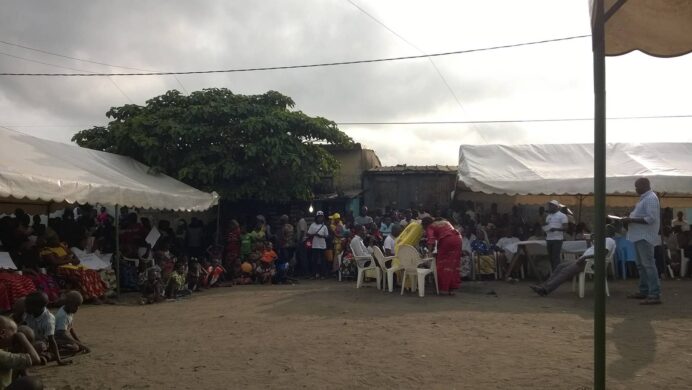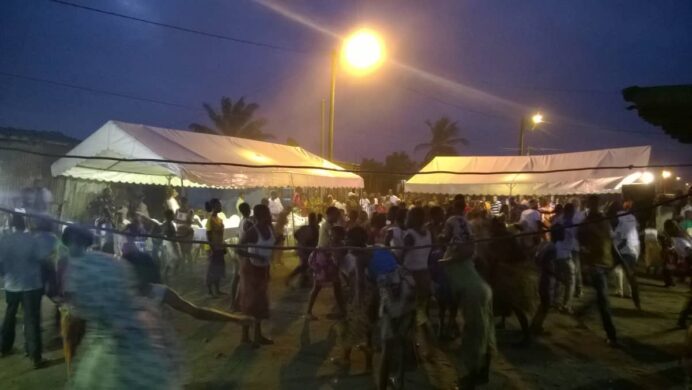Fabien Cante’s research in Abidjan, Côte d’Ivoire, considers the role of local radio stations in negotiating civic stability in the years since the Second Ivorian Civil War (2010-11). In “Post-Conflict Soundings”, a new sound piece made for The Political Voice, he takes us to hear public radio broadcasts, a wake and a deafening maquis [bar] in search of the political voice of the post-conflict city.
Post-Conflict Soundings: Noise and voice in Abidjan [full audio]
Introduction: Local radio as a sounding device [6.26 mins]
Part One: Interference; scrambling local voice [7.26 mins]
Part Three: Cover; maquis, noisy intimacies and revanchist silencing [7.44 mins]
Part Four: Concept; coupé‑décalé, noise-shapes and fugitive self‑expression [4.52 mins]
Conclusion: the noise of a city in the wake
- Haute autorité de la communication audiovisuelle, Les radios de proximité: Outils
de développement local (Abidjan, HACA, 2014). - See Francis Akindès (ed.) Côte d’Ivoire: La réinvention de soi dans la violence(Abidjan & Dakar: CODESRIA, 2011). Mike McGovern, Making war in Côte d’Ivoire (Chicago & London, University of Chicago Press, 2011).
- Katrien Pype, “On interference and hotspots: Ethnographic explorations of rural‑urban connectivity in and around Kinshasa’s phonie cabins”, Bulletin Des Séances - Mededelingen Der Zittingen, 62, (September 2019), pp.229–260.
- Fabien Cante, “Mediating anti-political peace in Abidjan: Radio, place and power”, Political Geography, forthcoming.
- Yacouba Konaté, “Abidjan: Malentendu, poésies et lieux propres”, Outre-Terre, 11, 2 (2005), pp.319–328.
- Anne Schumann, “Songs of a new era: Popular music and political expression in the Ivoirian crisis”, African Affairs, 112, 448 (2013), pp.440–459.
- Stéphanie Mahesse Kolé, “Le coupé-décalé: L’expression de la citadinité juvénile”, in Actes du colloque: Médias, communication et vie urbaine (Abidjan, ESRC/Université Félix Houphouët-Boigny, 2020), pp.20–37.
- Stefano Harney and Fred Moten, The undercommons: Fugitive planning and Black study (New York, Autonomedia, 2013); Saidiya Hartman, “The anarchy of colored girls assembled in a riotous manner”, South Atlantic Quarterly, 117, 3 (2018),
pp.465–490. - Christina Sharpe, In the wake: On Blackness and being (Durham, NC & London, Duke University Press, 2017).
- Andrew Navin Brooks, “ Fugitive listening: Sounds from the undercommons”, Theory, Culture & Society, online pre-print (2020). Available online:
doi.org/10.1177/0263276420911962 (Last accessed 14.07.20).

